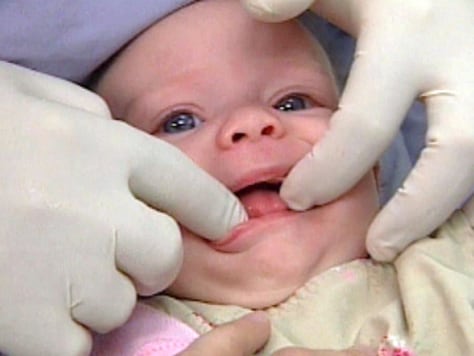
Numerous studies have shown that cavity-causing bacteria can pass from person to person through the transfer of saliva, such as sharing utensils, blowing on food, and yes, even kissing that sweet little bundle of joy on the mouth.
When Rachel Sarah took her daughter in for her first dental checkup a few years ago, she got a surprise. Not only did her 24-month-old have two cavities in her baby teeth, the pediatric dentist suggested she might have “caught” them from her mom.
“The dentist handed me this piece of paper that talked about saliva transfer,” said Sarah, a 37-year-old writer from San Francisco. “It said not to share cups or utensils or food and said, ‘No kissing your kid on the lips.’ I was shocked; I’d been taking a bite of food and then giving her a bite since she started eating. I told the dentist I’d never heard of this and he said these were new findings.”
As it turns out, studies about the transmission of cavity-causing bacteria from mom to baby have been published for 30 years. The primary culprit is Streptococcus mutans, a bacteria that can pass from person to person through the transfer of saliva, such as sharing utensils, blowing on food, and yes, even kissing that sweet little bundle of joy on the mouth.
According to a 2008 study in Pediatric Dentistry, “strong evidence demonstrated that mothers are a primary source of MS [mutans streptococci] colonization of their children; a few investigations showed other potential sources … notably fathers.”
“There have been many, many studies,” said Dr. Jane Soxman, a pediatric dentist from Allison Park, Pa. “It’s well-documented. You can’t blame it all on kissing a child on the lips — that’s one of several different factors that would have to be working together. But the main thing to know is that tooth decay is a bacterial infection and you can spread it from one person to another during the window of infectivity, which is during infancy and especially during the time of tooth eruption. That’s when the teeth are most vulnerable. It’s as if you had a bad cold and were kissing your child, you would spread the cold virus.”
Only parents (or caregivers) with active tooth decay can spread the Streptococcus mutans bacteria through the transfer of saliva. And Soxman stressed that the transmission of bacteria-laden saliva is just one piece of the puzzle. Tooth decay is caused by a combination of factors, including the transfer of infectious saliva, genetics, oral hygiene, and feeding practices, such as letting your baby constantly suck on a sippy cup full of juice or milk or other sugar-laden liquid. (Bacteria uses the sugar to produce acid, which breaks down enamel.) Baby teeth are particularly vulnerable to decay.
“When teeth first come into the mouth, when they first erupt, the enamel is very soft,” said Soxman. “They’re brand new virgin surfaces and are very susceptible.”
by Diane Mapes
I agree with the writer from San Francisco, we have to take necessary step while caring teeth of a baby. So after few months, we should take our baby to a dental visit, so we know few more things about the dental problem.
ReplyDeletedental studies in toronto